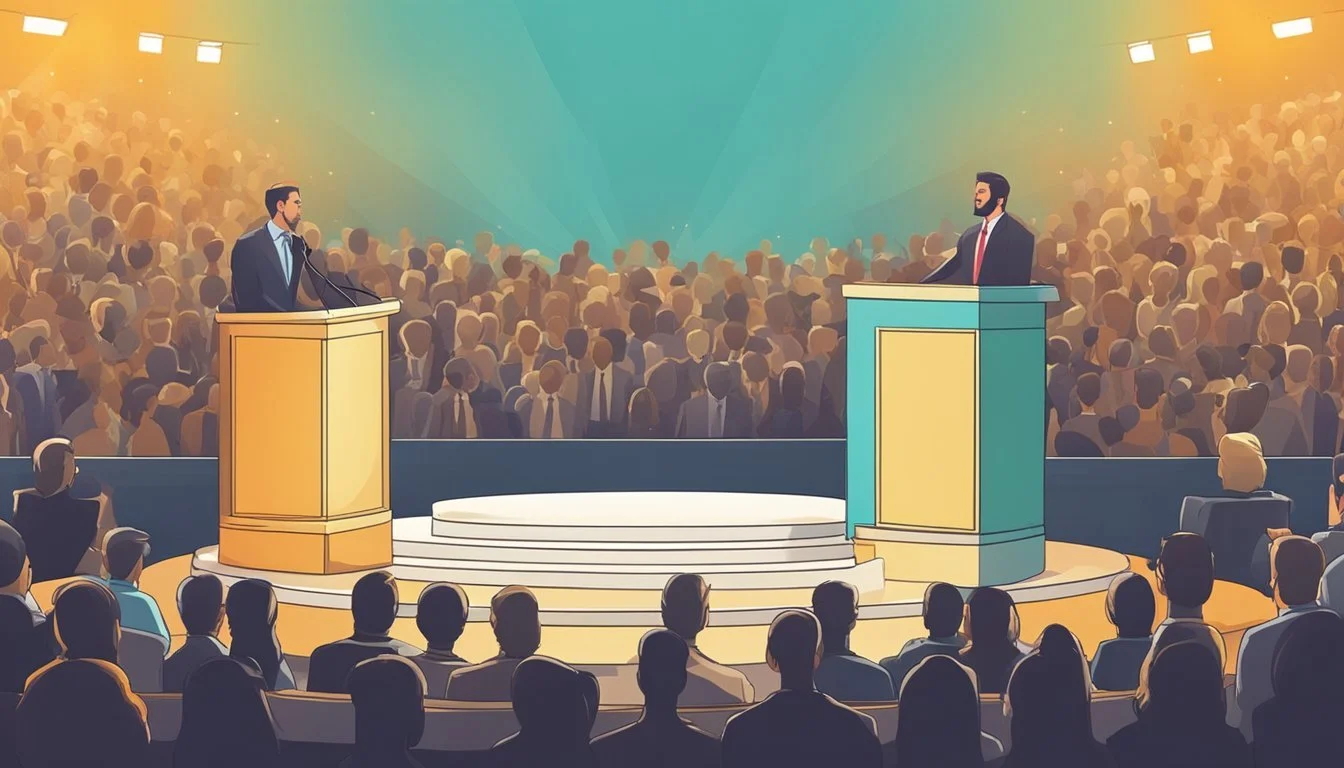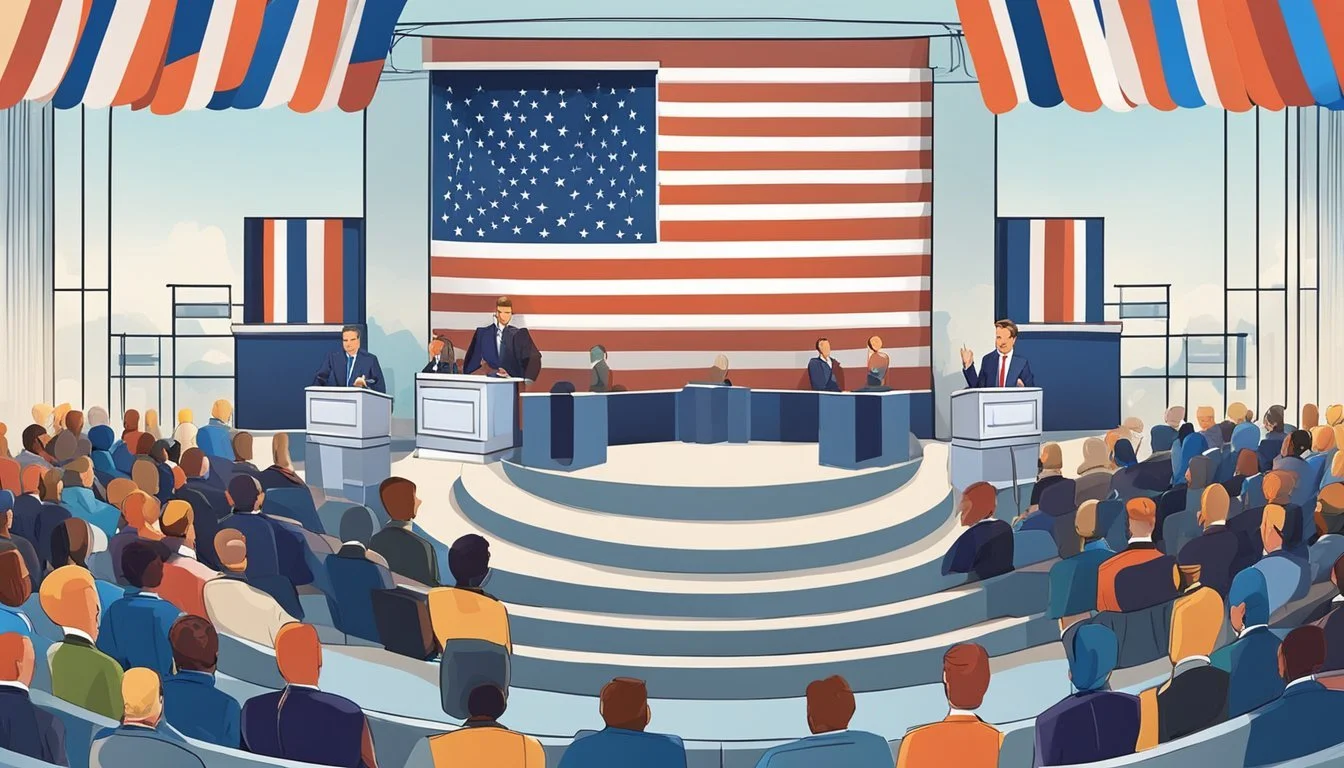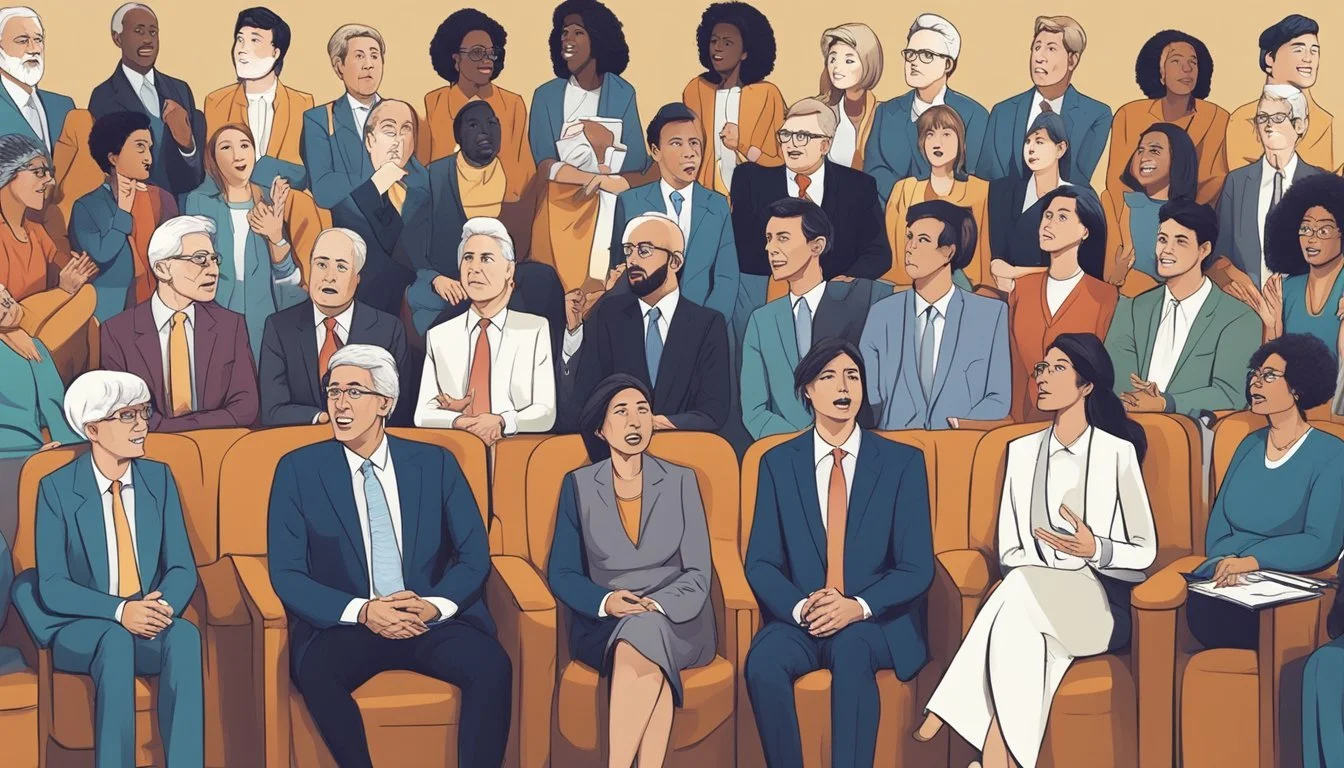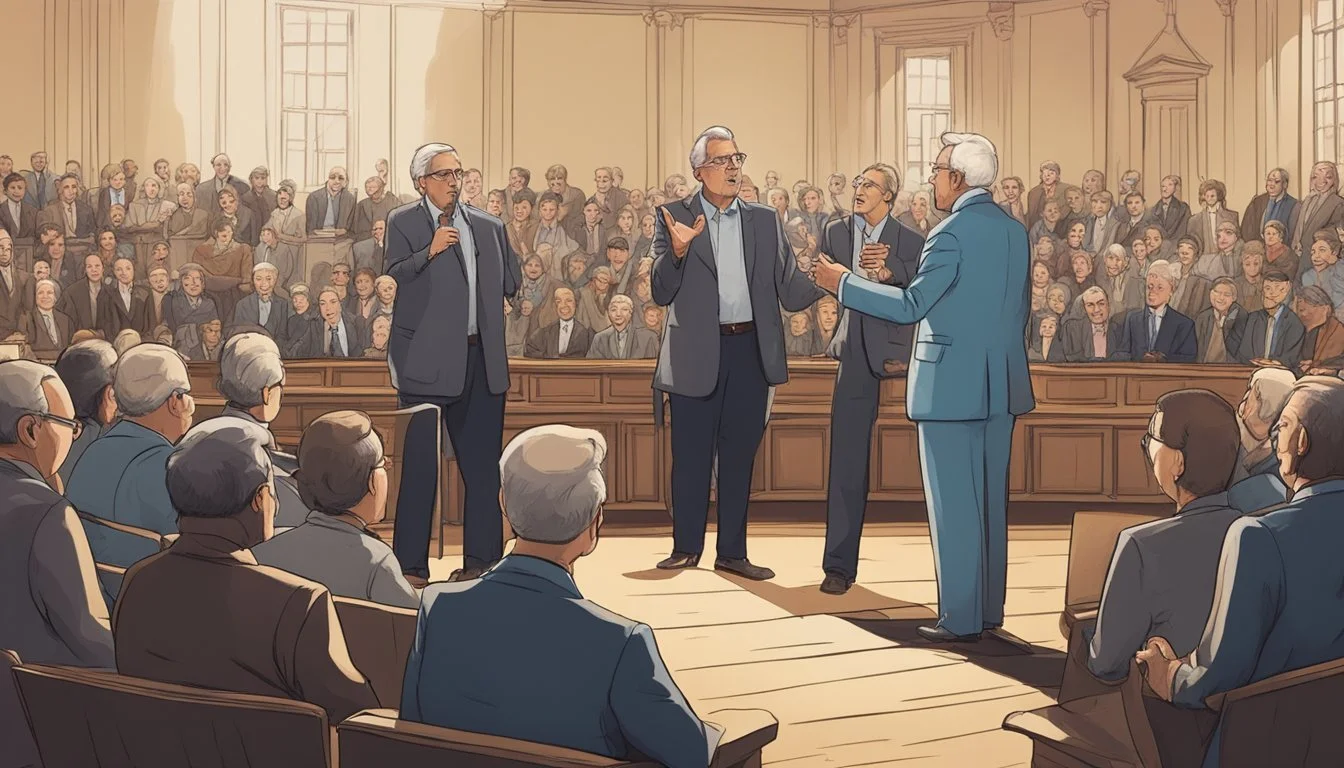Presidential Candidate Faces Off in Crucial Political Forum
Key Moments and Implications for 2024 Election
The 2024 presidential election season reached a pivotal moment with the debate between former President Donald Trump and Vice President Kamala Harris. Held in Philadelphia on November 2, 2024, just days before Election Day, the event drew intense national attention. The debate showcased sharp contrasts between the candidates' policies, leadership styles, and visions for America's future.
Trump and Harris clashed on key issues including the economy, immigration, and abortion rights. The former president sought to highlight his previous administration's accomplishments, while Harris emphasized her experience as vice president and plans for moving the country forward. The debate's format allowed for direct exchanges between the candidates, leading to several heated moments and memorable soundbites.
Viewers and analysts closely scrutinized the candidates' performances for signs of who might have the edge heading into the final stretch of the campaign. The debate's impact on undecided voters could prove crucial in what many expect to be a closely contested election. As both campaigns spin the results, the American public now has fresh material to consider when making their choice at the ballot box.
Historical Context
Donald Trump's debate performances have been a defining feature of recent U.S. presidential elections. His unconventional style and combative approach reshaped expectations for political discourse on the national stage.
Profile: Donald Trump
Donald Trump, a real estate mogul and reality TV star, entered politics as a Republican outsider. He won the presidency in 2016, serving one term from 2017 to 2021.
Trump's brash persona and "America First" agenda resonated with many voters. His presidency was marked by tax cuts, conservative judicial appointments, and an unconventional approach to foreign policy.
After losing the 2020 election, Trump continued to claim widespread voter fraud without evidence. This led to the January 6, 2021 Capitol riot by his supporters.
Previous Debates and Elections
Trump's debate style first emerged during the 2016 Republican primaries. He used personal attacks and memorable phrases to stand out in a crowded field.
In the 2016 general election debates against Hillary Clinton, Trump's aggressive tactics and unorthodox statements drew both praise and criticism. He often interrupted and talked over his opponent.
The 2020 debates against Joe Biden were similarly contentious. The first debate was particularly chaotic, leading to rule changes for subsequent events.
The Role of Debates in Presidential Elections
Presidential debates have been a staple of U.S. elections since 1960. They offer voters a chance to directly compare candidates' policies and personalities.
Debates can significantly impact public opinion and election outcomes. Memorable moments often become part of political lore, like Nixon's sweaty appearance in 1960 or Reagan's "There you go again" in 1980.
In recent years, debates have faced criticism for their format and moderation. Some argue they favor style over substance and fail to thoroughly examine complex issues.
Social media has amplified the impact of debates, with clips and memes spreading rapidly online. This has increased the pressure on candidates to deliver quotable moments.
Political Landscape
The 2024 presidential race showcases a stark contrast between candidates and their policy positions. Key issues like the economy and immigration dominate voter priorities. The political spectrum and swing voters play pivotal roles in shaping campaign strategies.
The 2024 Presidential Candidates
Donald Trump, the Republican nominee, faces off against Democratic Vice President Kamala Harris. Trump campaigns on his prior presidential experience and economic record. He emphasizes border security and immigration restrictions.
Harris positions herself as a progressive voice for change. She highlights her experience as Vice President under Biden. Her campaign focuses on expanding social programs and addressing income inequality.
Both candidates aim to appeal to middle-class voters through economic policies. Trump advocates for tax cuts and deregulation. Harris proposes increased infrastructure spending and minimum wage hikes.
Key Political Issues and Voter Priorities
The economy remains a top concern for voters in 2024. Inflation, job growth, and wage stagnation are central topics of debate. Trump touts his previous economic policies as solutions. Harris argues for new approaches to boost middle-class prosperity.
Immigration continues to be a divisive issue. Trump calls for stricter border control and limits on legal immigration. Harris supports a pathway to citizenship for undocumented immigrants and reforms to the immigration system.
Healthcare, climate change, and gun control also feature prominently in campaign discussions. Voters express concerns about rising medical costs and environmental threats.
Influences of the Political Spectrum and Swing Voters
The political landscape in 2024 reflects deep ideological divisions. Conservative and liberal bases energize their respective candidates. However, moderate and independent voters hold significant sway in key battleground states.
Swing voters in states like Pennsylvania, Michigan, and Florida become prime targets for both campaigns. These voters often prioritize economic issues and pragmatic solutions over ideological purity.
Rural voters tend to favor Trump's messaging on traditional values and job protection. Urban and suburban voters lean towards Harris's platform of social progress and environmental protection.
Both campaigns craft strategies to appeal beyond their base. They seek to portray their candidate as a unifying figure capable of bridging political divides.
Debates as a Platform
Presidential debates serve as crucial forums for candidates to present their views and engage directly with each other. These high-stakes events can shape public perception and influence voter decisions in the lead-up to elections.
The Significance of Presidential Debates
Presidential debates offer voters a unique opportunity to see candidates side-by-side, comparing their policies, temperaments, and leadership qualities. These events often draw massive audiences, with millions tuning in to watch contenders spar on key issues.
Debates can reveal candidates' abilities to think on their feet and handle pressure. Strong performances can boost a campaign, while poor showings may damage a candidate's prospects.
In recent elections, debates have become must-watch political theater, generating headlines and social media buzz that can impact the race.
Role of Debate Moderators and Formats
Moderators play a pivotal role in shaping debate dynamics. They select questions, manage time, and maintain order among participants.
Different debate formats can affect candidate interactions:
Town hall: Allows direct audience questions
Single moderator: Focused, in-depth discussions
Panel format: Multiple journalists pose diverse queries
The chosen format can highlight various candidate strengths or weaknesses. Moderators must balance fairness with pressing candidates on important issues.
Potential Impact on Polls and Public Opinion
Debates can cause significant shifts in public opinion and polling numbers. A strong debate performance may lead to a surge in support, while gaffes or missteps can erode a candidate's standing.
Post-debate polls often show immediate reactions:
Candidate favorability ratings
Issue-specific approval
Overall debate winner
Media coverage and expert analysis following debates can amplify or diminish their impact on public perception. Social media discussions also play a growing role in shaping post-debate narratives.
Ford v. Biden: A Case Study
The 1976 debate between Gerald Ford and Jimmy Carter offers insights into debate impact. Ford's mistaken claim about Soviet influence in Eastern Europe became a defining moment.
This error:
Dominated news coverage
Eroded Ford's foreign policy credibility
Potentially influenced the election outcome
The incident underscores how a single debate moment can alter a campaign's trajectory. It demonstrates the high stakes and intense scrutiny candidates face in these televised confrontations.
Decisive Issues in Debates
Presidential debates often hinge on key policy areas that resonate with voters. These topics shape public discourse and can significantly influence electoral outcomes.
Economy and Cost of Living
The state of the economy remains a top concern for voters. Candidates typically focus on job creation, inflation control, and strategies to reduce the cost of living. Trump emphasizes his past economic record, pointing to low unemployment rates during his presidency. Harris highlights the current administration's efforts to boost middle-class incomes and reduce inflation.
Both candidates present plans to address rising housing costs and consumer prices. Trump advocates for tax cuts and deregulation to stimulate economic growth. Harris promotes investments in infrastructure and clean energy jobs to bolster the economy.
Immigration Policies and Border Security
Immigration is a contentious issue that often sparks heated debate exchanges. Trump reiterates his stance on strict border control, proposing enhanced wall construction and increased deportations. He criticizes the current administration's handling of migrant influxes.
Harris defends the administration's approach, emphasizing humane treatment of asylum seekers and a path to citizenship for certain undocumented immigrants. She highlights efforts to address root causes of migration in Central America.
Both candidates face questions about specific policies regarding Haitian immigrants and the overall management of the U.S.-Mexico border.
Healthcare, Reproductive Rights, and Abortion
Healthcare debates center on affordability and access. Trump critiques the Affordable Care Act and proposes market-based solutions. Harris advocates for expanding public healthcare options and lowering prescription drug costs.
Abortion rights have become a crucial debate topic following the Supreme Court's overturning of Roe v. Wade. Harris strongly supports abortion rights and opposes national abortion bans. Trump takes credit for appointing justices who overturned Roe and maintains a pro-life stance.
Candidates discuss their positions on federal abortion legislation and the role of states in regulating the procedure.
Foreign Policy Aimed at China and International Relations
U.S.-China relations dominate foreign policy discussions. Trump advocates for a tough stance on trade, intellectual property, and military posturing in the South China Sea. He criticizes the current administration's approach as too lenient.
Harris emphasizes diplomatic engagement with China while maintaining a firm position on human rights and fair trade practices. She highlights the importance of working with allies to address global challenges posed by China.
Both candidates present strategies for economic competition with China and addressing national security concerns.
Environmental Policies on Climate Change
Climate change policies reflect stark differences between the candidates. Harris supports aggressive action to reduce carbon emissions, including investments in renewable energy and rejoining international climate agreements.
Trump questions the severity of climate change and argues that environmental regulations harm economic growth. He advocates for energy independence through fossil fuel production.
Debate moderators press candidates on specific plans to address climate-related disasters and the economic impact of environmental policies.
Donald Trump's Policies and Performance
Donald Trump's presidency was marked by significant policy changes and controversial decisions. His approach to key issues like immigration, the economy, and foreign policy sparked intense debate and shaped his public image.
Evaluation of Trump's Presidency
Trump's economic policies focused on tax cuts and deregulation. The Tax Cuts and Jobs Act of 2017 reduced corporate tax rates and modified individual tax brackets. Unemployment rates reached historic lows during his term, though the COVID-19 pandemic later caused a sharp economic downturn.
On immigration, Trump pursued stricter policies. He implemented travel bans on several predominantly Muslim countries and pushed for the construction of a border wall with Mexico. These actions faced legal challenges and criticism from opponents.
Trump's "America First" foreign policy led to renegotiated trade deals and a more confrontational stance with China. He imposed tariffs on various imported goods, sparking trade disputes with multiple countries.
Trump's Stance on Major Debate Topics
Trump maintained a strong anti-abortion position throughout his presidency. He appointed three conservative justices to the Supreme Court, potentially impacting future abortion rights decisions.
On the economy, Trump emphasized job creation and GDP growth. He frequently touted stock market performance as evidence of economic success.
Regarding foreign policy, Trump pursued direct negotiations with North Korea and brokered normalization agreements between Israel and several Arab states.
Trump's handling of the January 6 Capitol riot became a major point of contention. He faced criticism for his rhetoric leading up to the event and his response to the violence.
Controversies and Public Perception
Trump's presidency was marked by numerous controversies. His use of social media, particularly Twitter, often generated headlines and criticism.
The Mueller investigation into Russian interference in the 2016 election dominated much of Trump's first term. While it did not result in charges against Trump, it remained a divisive issue.
Trump's response to the COVID-19 pandemic drew both praise and criticism. His public statements sometimes contradicted health experts' recommendations.
Public perception of Trump remained highly polarized throughout his presidency. His supporters praised his unconventional approach, while critics accused him of undermining democratic norms.
Effect on Specific Demographics
The Trump-Harris debate had varying impacts on different segments of the American electorate. Key issues like reproductive rights, economic policies, and immigration shaped voter perceptions across demographic groups.
Women's Voting Patterns and Reproductive Rights
Trump's stance on abortion rights sparked intense reactions among female voters. His appointment of conservative Supreme Court justices led to the overturning of Roe v. Wade, galvanizing pro-choice advocates. Harris emphasized her commitment to protecting reproductive freedoms, potentially swaying undecided women voters.
Many suburban women, a crucial swing demographic, showed increased interest in Democratic policies following the debate. The candidates' contrasting views on paid family leave and childcare also influenced women's voting intentions.
Impact on Middle Class and Working Families
Economic policies took center stage in discussions affecting middle-class and working families. Trump touted his tax cuts and job creation record, claiming they benefited average Americans. Harris countered by highlighting income inequality and proposing an expanded Child Tax Credit.
The debate's focus on healthcare costs resonated with many middle-class voters. Trump's promise to repeal the Affordable Care Act clashed with Harris's support for expanding coverage, influencing opinions on kitchen-table economic issues.
The Position of Minority and Immigrant Communities
Immigration emerged as a divisive topic, with Trump defending his border policies and Harris criticizing them as inhumane. This exchange likely reinforced existing views among immigrant communities and their supporters.
Harris's personal story as a child of immigrants contrasted sharply with Trump's rhetoric on migration. This dynamic potentially energized minority voters, particularly in key swing states.
The candidates' differing approaches to racial justice and police reform also impacted perceptions among Black and Latino voters, two critical demographics in the 2024 presidential election.
Media's Role in Debates
Media plays a crucial part in shaping the public's perception of presidential debates. Broadcast networks and digital platforms provide extensive coverage, while fact-checkers scrutinize candidates' statements in real-time.
Importance of Broadcast and Digital Media
Television networks remain the primary medium for debate viewership. ABC News, among other major networks, broadcasts these events to millions of Americans. Digital platforms expand the reach, allowing viewers to stream debates online and participate in discussions on social media.
Debate moderators, often seasoned journalists, guide the conversation and press candidates on key issues. Their role is to maintain order and ensure a balanced dialogue. During the Trump-Harris debate, moderators faced challenges in managing interruptions and steering the discussion back to policy matters.
Fact-Checking and Post-Debate Analysis
Real-time fact-checking has become integral to debate coverage. News organizations deploy teams to verify candidates' claims instantly. This immediate scrutiny helps inform viewers and holds debaters accountable for their statements.
Post-debate analysis involves political commentators and experts dissecting candidates' performances. They evaluate debate strategies, body language, and policy positions. This analysis often influences public opinion on who "won" the debate.
Social media platforms serve as a barometer for public reaction. Viewers share opinions, creating trending topics that can shape the narrative around a candidate's debate performance. These online discussions often continue long after the broadcast ends.
Other Influential Figures
The 2024 presidential debate between Donald Trump and Kamala Harris attracted attention from various influential figures across the political spectrum. Their endorsements, opinions, and analyses shaped public perception and influenced voter sentiment.
Political Endorsements and Their Effects
Political endorsements played a significant role in the lead-up to the Trump-Harris debate. Several prominent politicians threw their support behind the candidates, impacting voter perceptions. Republican senators and governors largely backed Trump, emphasizing his experience and policy positions. Democratic leaders rallied behind Harris, highlighting her vision for the future.
Some endorsements crossed party lines. For example, former Republican Senator John McCain's family endorsed Harris, citing concerns about Trump's leadership style. This unexpected move garnered media attention and sparked discussions about changing political allegiances.
Endorsements from respected political figures helped solidify support within party bases while also potentially swaying undecided voters.
Celebrity Opinions, including Taylor Swift as an Example
Celebrities wielded considerable influence in shaping public opinion surrounding the debate. Pop superstar Taylor Swift made headlines with her endorsement of Kamala Harris on Instagram immediately following the debate. Swift's post reached millions of followers, particularly young voters.
Other celebrities from various industries also voiced their opinions. Actors, musicians, and athletes used their platforms to express support for their preferred candidates. Some hosted fundraisers or appeared at campaign events.
Celebrity endorsements often generated mixed reactions. While they increased visibility for candidates, critics argued that entertainment figures should not sway political decisions. Nonetheless, their impact on voter engagement remained significant.
The Perspective of Political Analysts and Thought Leaders
Political analysts and thought leaders provided in-depth commentary on the Trump-Harris debate. They examined the candidates' performance, fact-checked statements, and assessed potential impacts on the election.
Respected political commentators offered insights into debate strategies and policy implications. Some focused on body language and rhetorical techniques, while others delved into the substance of policy proposals.
Think tanks and policy experts published analyses of the candidates' positions on key issues such as the economy, healthcare, and foreign policy. These detailed breakdowns helped voters understand the potential consequences of each candidate's proposed policies.
Media outlets invited panels of experts to discuss debate highlights and lowlights, providing diverse perspectives across the political spectrum. This range of expert opinions contributed to a more informed public discourse surrounding the presidential race.
The Future of Leadership
The 2024 election outcome will shape America's trajectory. Key priorities include economic opportunity and governmental reform initiatives.
Vision for America's Future post-2024 Election
Donald Trump's vision for America's future emphasizes economic growth and national security. He aims to reduce regulations, lower taxes, and prioritize domestic manufacturing. Trump's foreign policy focuses on putting "America First" through trade renegotiations and a strong military presence.
His approach to immigration involves stricter border control and merit-based entry systems. Trump advocates for energy independence and increased fossil fuel production. He supports school choice and promotes patriotic education curricula.
Critics argue his policies may increase inequality and environmental risks. Supporters believe they will boost economic prosperity and global competitiveness.
Pathways to the Opportunity Economy and Project 2025
The Opportunity Economy concept seeks to expand economic access for all Americans. It emphasizes job creation, skills training, and entrepreneurship support. Project 2025 outlines conservative policy goals for the next presidential term.
Key elements include:
Tax simplification and reduction
Deregulation of industries
School choice expansion
Healthcare market reforms
Proponents argue these measures will unleash economic growth and innovation. Critics contend they may benefit corporations over workers and reduce social protections.
The project also calls for reforming federal agencies and reducing their size. It aims to shift power from Washington to state and local governments.





